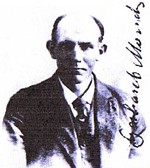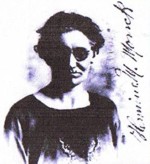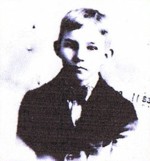  |
Moenk Family Trip to Germany—1922 | |||
 Gerhard Moenk Gerhard Moenk
|
G. Moenk Returns from Germany
Mr. and Mrs. Gerhard Moenk and their young son, Arthur, of Wayne township, who left here last April for a visit in Holstein (note: should be Horsten according to Mr. and Mrs. Gerhard Moenk’s passports), Germany, returned last Monday evening, accompanied by Mr. and Mrs. Fred Ortgies, Johanna Harms, Ernest Theilen and Gertrude Henkel, all from Prussia. Of these newcomers, Fred Ortgies once visited here for several months. He will be in the market for the rental of an 80 acre farm. Misses Johanna Harms and Anna Moenk are relatives, one a niece and the other a second cousin of Mr. Moenk. Gertrude Henkel, a bright looking girl of 12 years, will enter the home of Henry Rodick in Monticello. Ernest Theilen, a nephew of Mr. Moenk, will go to a brother in Fariview township. Mr. Moenk said he and his family had a fine summer traveling through Germany and Switzerland and visiting the principal cities, but that they were might glad to get home again. He said, “I could not be induced to return there to live.” Asked as to the conditions there he replied, “The marks are so low that times are very hard for the laboring people and those of a fixed income like school teachers and people depending on interest money. For instance, a laboring man will earn 4,000 marks in six days, and for butter, if he buys any at all, he must pay from 1,000 to 1,200 marks a pound. A pound loaf of bread costs 120 marks. This is all very cheap for one having American money, but it is dear for a German working for depreciated currency. It was suggest to Mr. Moenk that it was the right time for American Germans, having relatives in the old country to give them the help they need when a ten dollar American bill sent them in marks would go so far. He said, “That is very true. If they could only see them as I saw them and hear them as I heard them, there would be a rush to send the few dollars which would never be missed. I saw old people with tears in their eyes in real want, who have children in this country who could cheaply and easily make them comfortable. The farmers are the best off, for they can raise enough to eat. The laborers are fearing short work this winter, and they know that will mean short rations and hungry stomachs. There were many tourists in Germany the past summer, who left a good deal of money in the country, but that helped only a certain class, and did not aid the very poor people to any great extent.” Mr. Moenk denied the reports current, of which he was given information, to the effect that it cost him a considerable sum to get out of the country because he had overstayed his time, and also because he had left years ago when eligible for military duty. “Nothing to it, “he said, I have been an American citizen for 25 years and I had not the least bit of trouble. I was not bothered even for a look at my passport, except when I crossed the border from one country to another.” He reports that the crops are good and potatoes cheaper than any other provisions. Source: Monticello Express, November 30, 1922
|
| ||


© Copyright 1997-2013, The Art Department, © Copyright 2014-2020, Richard Harrison.
| ||||
 Hermine Moenk
Hermine Moenk
 Arthur Moenk
Arthur Moenk